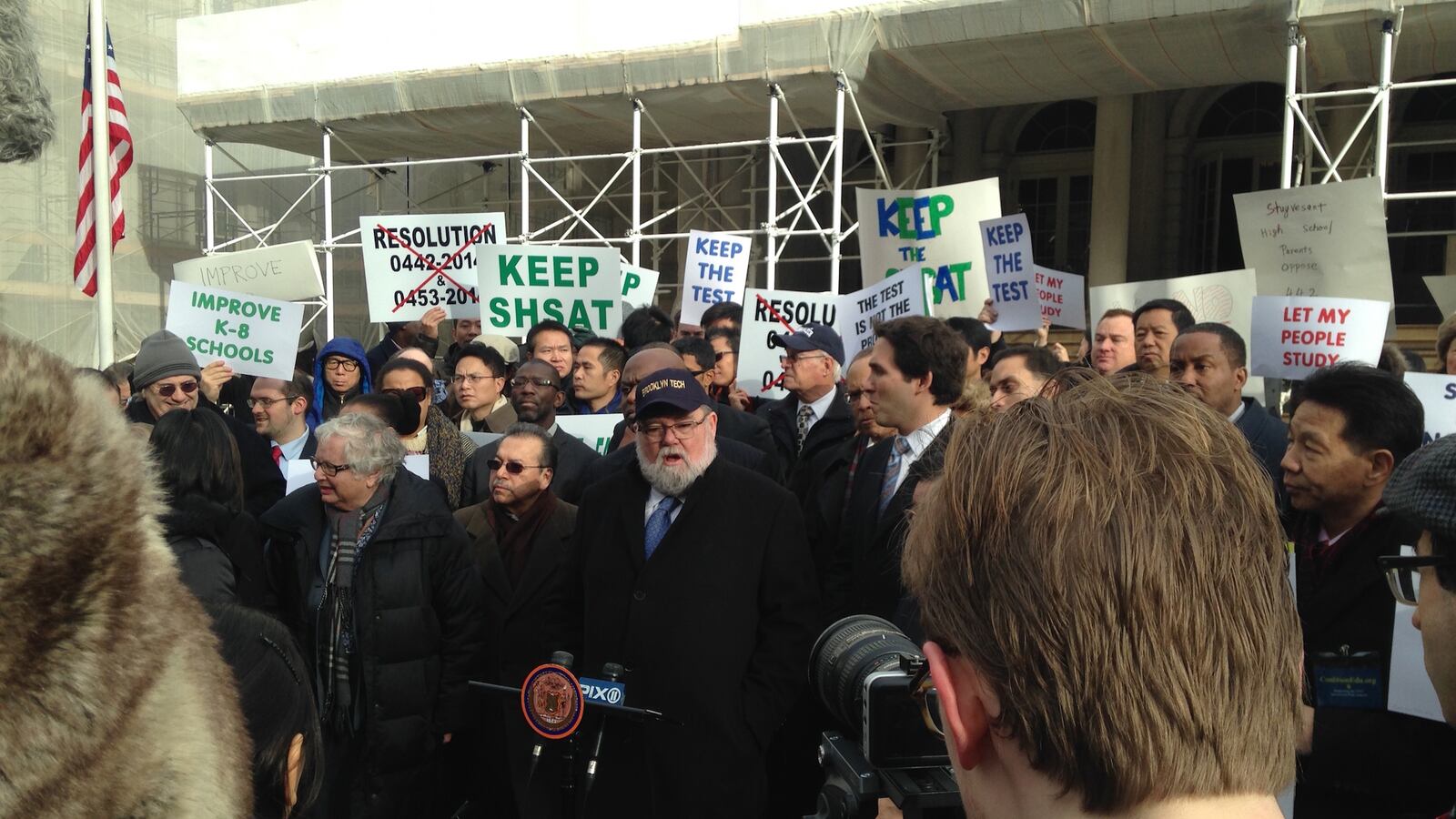Deep divisions emerged at a City Council hearing Thursday on school diversity, as policymakers debated the merits of city’s specialized high school admissions test and city officials promised to consider a variety of enrollment policy changes.
Mayor Bill de Blasio wants state lawmakers to support a bill that would allow the three oldest specialized high schools to consider multiple criteria when admitting students, something he, Chancellor Fariña, and civil rights advocates say could increase diversity at those schools, where black and Hispanic enrollment has steadily fallen in recent years. Only 11 percent of the offers to the eight schools went to black and Hispanic students this spring.
“It has become the norm throughout our education system, our higher education system, that we look to multiple criteria for admissions to these venerated institutions,” Councilman Stephen Levin, of Brooklyn, said during the hearing. “To me, this seems like an antiquated system that reduced our student to one test on one day.”
But supporters of current system, from within and outside the council, point to the test as method that has worked successfully for generations. They point out that many of the city’s screened high schools, which look at factors like attendance and school grades when making admissions decisions, have a higher percentage of white students than the specialized schools.
“The test is not discriminatory,” Queens City Councilman Peter Koo said during the hearing. “If it’s discriminatory, how is it that second generation of immigrants can get in, people from India and the Caribbean? They have dark skin.”
“If I was trying to get into a multiple-criteria school I would not have gotten in,” said City Councilman Jumaane Williams, a Brooklyn Tech alumnus who is black. “The only way I got in was through testing.”
The City Council has no authority to make admissions policy changes. But the discussion activated alumni and parents of students at the schools, and dozens converged on the City Hall for Thursday’s meeting. Retaining the exam and additional diversity don’t need to be mutually exclusive, they said.
“Fundamentally, the test reflects the failure of New York City School system,” President of the Coalition of Specialized High School Alumni Organizations Larry Cary told reporters assembled outside City Hall on Thursday. His organization sent a five-page letter Council Speaker Melissa Mark-Viverito earlier this month urging her to vote ‘no’ on the City Council’s resolution in support of the state bill.
The fact that few black and Hispanic students are winning spots based on the test “reflects racism and it reflects the lack of preparation the school system give the kids in the black and Hispanic community,” Cary added.
The admissions policies at Bronx Science, Brooklyn Tech and Stuyvesant high schools were enshrined in state law in 1971. The authority to change the admissions policy at the other five specialized high schools that rely on the specialized test lies with the city, though the Department of Education has not said it will make any moves without state support for changing the policies at the other three schools.
What city officials did say Thursday is that they are working to expand the number of students taking the specialized high school exam by asking all middle school guidance counselors to push the top 15 percent of their students to sign up for the SHSAT. Providing more and better access to test preparation, City Council members, the alumni coalition, and city officials agreed, should be a priority whether the admissions policy changes or not.
But a two-year tutoring program aimed specifically at preparing low-income students for the exam has gotten smaller. Ursulina Ramirez, the Chancellor’s chief of staff, said during her testimony that the program, called DREAM Specialized High School Institute, has been hamstrung by a lack of funding. Eight hundred students enrolled in DREAM when it launched in 2012, but only 450 slots were funded this year even though more than 6,000 students qualified.
“While we would like to expand the program to meet the demand, we are limited by funding constraints,” Ramirez said.
Department of Education officials also said they had trouble recruiting students for the program in the South Bronx, central Harlem and central Brooklyn, where students often have to care for younger siblings or problems at home that interfere with attendance.
“There are issues getting information out to students who qualify and keeping them enrolled in the test prep,” said Ainsley Rudolfo, executive director of program and partnerships at the Department of Education’s Office of Equity and Access. “Life has been getting in the way.”
The hearing also addressed broader issues of diversity in the city’s schools, including a bill that would require the city to release more information about school-level diversity and another that would require the city to “prioritize” diversity in its admissions policies, and when it creates new schools or rezones schools.
Department officials said the chancellor was committed to diversity and would support the resolution requiring annual diversity reports.


